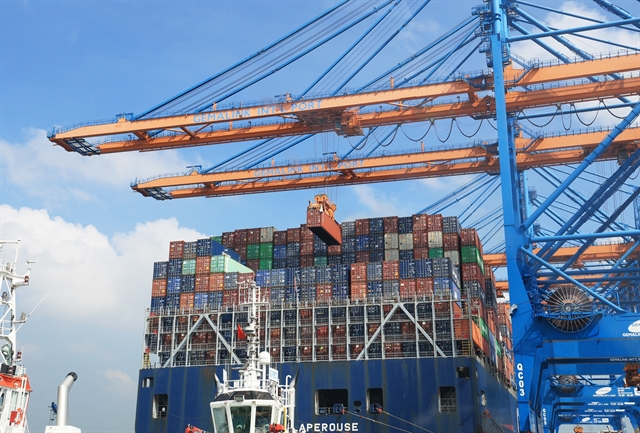 Politics & Law
Politics & Law


|
| A view of the Gemalink International Port in Phú Mỹ Town, Bà Rịa-Vũng Tàu Province. VNA/VNS Photo |
HÀ NỘI - The Politburo has ushered in a new stage in Việt Nam’s comprehensive global integration process with a recently issued resolution on international integration in the new context.
Party General Secretary Tô Lâm said that Resolution No 59-NQ/TW, dated January 24, reflects the spirit and power of the times and elevates international integration with visionary, revolutionary and scientific perspectives.
The resolution aims to improve the effectiveness, consistency and depth of international integration; maintain a peaceful and stable environment; maximise external resources and favourable conditions to build an independent, self-reliant economy; enhance national strength and elevate Việt Nam’s role and prestige; and help the country become a developed, socialist-oriented, high-income nation by the mid-21st century.
Resolution 59 marks a historic turning point in Việt Nam’s international integration process, identifying integration as a strategic motivation for the nation to confidently enter a new era.
Since 1986, Việt Nam has made impressive strides in its international integration process. The country has to date established diplomatic relations with 194 countries, and set up strategic and comprehensive partnerships with 34 nations. It is now a member of over 70 regional and international organisations, and joined numerous global economic cooperation agreements and frameworks, including 17 free trade agreements (FTAs).
Since 2019, Việt Nam has ranked among the 20 countries with the largest scale of trade in the world, and among the 20 economies attracting the most foreign investment worldwide.
However, the Party leader acknowledged that, from an objective and serious perspective, the outcomes of international integration have not fully met expectations or goals, and have yet to satisfy development requirements, especially as many shortcomings and bottlenecks have continued to hinder progress.
According to Lâm, international integration has offered numerous opportunities but also brought challenges, including unfair competition, unsustainable growth, widening income gaps, environmental pollution and risks of ideological deviation, cultural infiltration, internal "self-evolution" and "self-transformation," and the “erosion of trust”.
To avoid losing direction in the process of international integration, it is essential to recognise that internal strength plays a decisive role. Strengthening domestic capacity must go hand in hand with leveraging external resources. Internal strength is the foundation and core driver of national power.
Resolution 59 states that a key solution for integration in the new context is to improve the effectiveness of international economic integration by building an independent, self-reliant and resilient economy, accelerating economic restructuring, renovating the growth model and promoting the digital transformation.
Internal strength is the root of Việt Nam’s power, but the country’s current internal capacity is not yet truly solid. The majority of Việt Nam’s export value is still generated by foreign direct investment (FDI) enterprises, leading to high output but limited value added to the national economy. Việt Nam lacks many key economic sectors and enterprises capable of expanding and competing in regional and global markets.
In international integration, only nations with strong internal capacity can compete with powerful economies. If Việt Nam does not properly prepare its production foundation, integration will not produce the expected results.
The nation's internal strength not only includes capital, land and labour but also science and technology, innovation and creativity.
Resolution 59 is thus closely linked to the Politburo's Resolution No 57-NQ/TW dated December 22, 2024, which emphasises the development of science, technology, innovation and national digital transformation as a top strategic priority and a main driver for rapidly advancing modern productive forces, improving relations, renewing national governance, promoting socio-economic development, preventing the risk of falling behind and propelling the country toward prosperous development in the new era.
Under the resolution, elevating international integration is closely linked to strengthening Việt Nam’s internal capacity and upholding its policy of independence and self-reliance. This internal strength and independence form the foundation and prerequisite for proactive and effective international integration.
Broadly understood, internal strength reflects a nation's sovereignty and autonomy in choosing its own development path. It encompasses political, economic, cultural, defence, security and diplomatic independence. Without a solid internal capacity and true independence, proactive and meaningful international integration is not possible.
Conversely, international integration enhances the country’s ability to safeguard national independence and self-reliance. Without integration, if Việt Nam were still isolated or subject to embargo, the country would not have achieved its current status as one of the world’s 34 largest economies. From a starting point of just US$22 billion in combined GDP in 1975, Việt Nam’s economy has grown nearly 100-fold since 1986, with per capita income rising to nearly $5,000 per year from less than $100.
In the economic sphere, Việt Nam has elevated its level of international integration while simultaneously strengthening internal capacity, focusing on developing economic institutions in line with global integration based on the principles of independence and self-reliance, maintaining a socialist orientation within the market economy and ensuring that the national economy does not overly rely on external resources. A core principle is to place national interests above all else in the process of international integration.
Việt Nam is set to further step up its international integration by “keeping pace with the world, identifying and tapping opportunities to position the country in the flow of the times over the next 10 to 20 years,” the Party chief said. Failing to do so and integrating passively would inevitably lead to the risk of falling behind.
In his article, titled Rising up in international integration, the General Secretary stressed: “In the interdependent world today, the development of each nation cannot be isolated or immune to the influences of the world and the era, or the prevailing circumstances."
The nation is facing a great opportunity to rise up, but it is also confronting immense challenges. Achievements in integration thus far have contributed to building strength and momentum for the next breakthroughs. Building on this spirit, Resolution 59 marks a significant shift in the Party's mindset and orientation for international integration in the next few years, creating motivation to propel the country toward the glorious stage of independence, freedom, happiness, prosperity and lasting success. VNS




